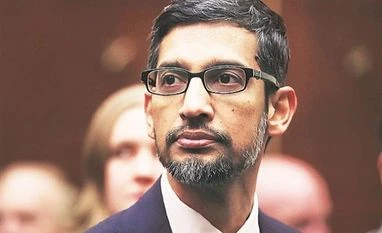Google will invest close to $10 billion (around Rs 75,000 crore) in India over the next five to seven years through a “Google for India Digitisation Fund”.
Announcing this on Monday at the sixth edition of the company’s “Google for India” event, Sundar Pichai, chief executive officer of Alphabet Inc. and its subsidiary Google, said the firm was committed to empowering small businesses and building products suited to the country’s needs.
“We will do this through a mix of equity investment, partnership, and operational, infrastructure and ecosystem investments,” Pichai said at the event, conducted in collaboration with the Ministry of Electronic and Information Technology (MeitY) and live-streamed using Google India’s YouTube channel. “This is a reflection of our confidence in the future of India and its digital economy.”This is the largest investment in India by Google, headquartered in California.
Separately, Pichai also interacted with Prime Minister Narendra Modi on Monday through videoconferencing. Pichai briefed the prime minister about the efforts of Google to help spread awareness and provide information about Covid-19.
Modi pitched the idea of virtual labs that can be used by students as well as farmers while Pichai briefed him about new products and initiatives by Google in the country such as the launch of AI Research Lab in Bengaluru. They also discussed data security, privacy, and cyber attacks.
Apart from its indirect investment in the country, Google has made direct investment in start-ups suchas hyper-local delivery app Dunzo and e-commerce app Fynd.
Alphabet’s investment arm, Capital G, has invested in fintech Aye Finance and SaaS-company Freshworks. The “Google for India Digitization Fund” will enable affordable access and information for Indians in languages such as Hindi, Tamil, and Punjabi. The fund will also be utilised for empowering businesses in digital transformation and leveraging technology and artificial intelligence (AI) in areas like health, education, and agriculture, Pichai said.
Focusing on India takes centre stage for global tech giants such as Facebook, Amazon, and Google as India emerges as the country having the largest number of internet users. In April, Facebook picked up a minor stake in Jio for $5.7 billion, making it the largest foreign direct investment in the technology space in India. Earlier this year, Jeff Bezos’ Amazon committed to investing $1 billion in the country to power small businesses shift online.
Ravi Shankar Prasad, minister for communications, electronics and IT, said at the virtual event: “There is immense scope for Google to deploy AI and undertake new initiatives in the field of agriculture, weather prediction, health care in the wake of Covid-19 challenges and most importantly in digital education.”
Pichai spoke about innovations including GPay, which, he said, had set global standards for digitised payments. He also talked about the Bolo app, which was launched in India last year to help children learn languages by reading, and also an AI-powered flood forecasting system as examples of Google’s efforts in India. Bolo has been rechristened Read Along and rolled out in nine languages in more than 180 countries.
Focus on small biz, education
Google shared one of its “most exciting success stories” of digitisation SMBs in India and making them discoverable over searches and maps. “Every month we drive over 150 million direct connections between these businesses and customers including calls, online reservations, and direction requests,” Pichai said.
The tech giant also announced launching edutainment series, in partnership with Prasar Bharati, on how small businesses could adopt digital tools. Google, along with the Central Board of Secondary Education, will help enable 1 million teachers in over 22,000 schools to adopt a blended approach of online and classroom teaching by the end of the year. “This will use free tools such as G-Suite, Google Classrooms, and YouTube. Educators have to quickly adjust to the reality as over 320 million students in India have been impacted by school closures because of the Covid-19 outbreak,” said Sapna Chadha, senior country marketing director, Google India and Southeast Asia.
At the event, Google shared updates on the work it had been doing since the pandemic came to India. It has made available the information on over 11,000 food and night shelters in more than 700 cities and towns, and is working with MyGov, states, and Indian Council for Medical Research.
Google supports OECD engagement on digital taxes
Google supported a multilateral solution for taxing digital services that is under discussion by the Organization for Economic Cooperation and Development (OECD), Pichai told Reuters in an interview. The OECD talks involve over 100 countries on a major rewrite of global tax rules to bring them up to date for the digital era, but they have so far not produced results as the negotiations have been complicated by the coronavirus pandemic. The US has already initiated investigations of digital services taxes adopted or being considered by countries such as France, India and Turkey, saying these discriminate against US tech firms.
Unlock 30+ premium stories daily hand-picked by our editors, across devices on browser and app.
Pick your 5 favourite companies, get a daily email with all news updates on them.
Full access to our intuitive epaper - clip, save, share articles from any device; newspaper archives from 2006.
Preferential invites to Business Standard events.
Curated newsletters on markets, personal finance, policy & politics, start-ups, technology, and more.
)